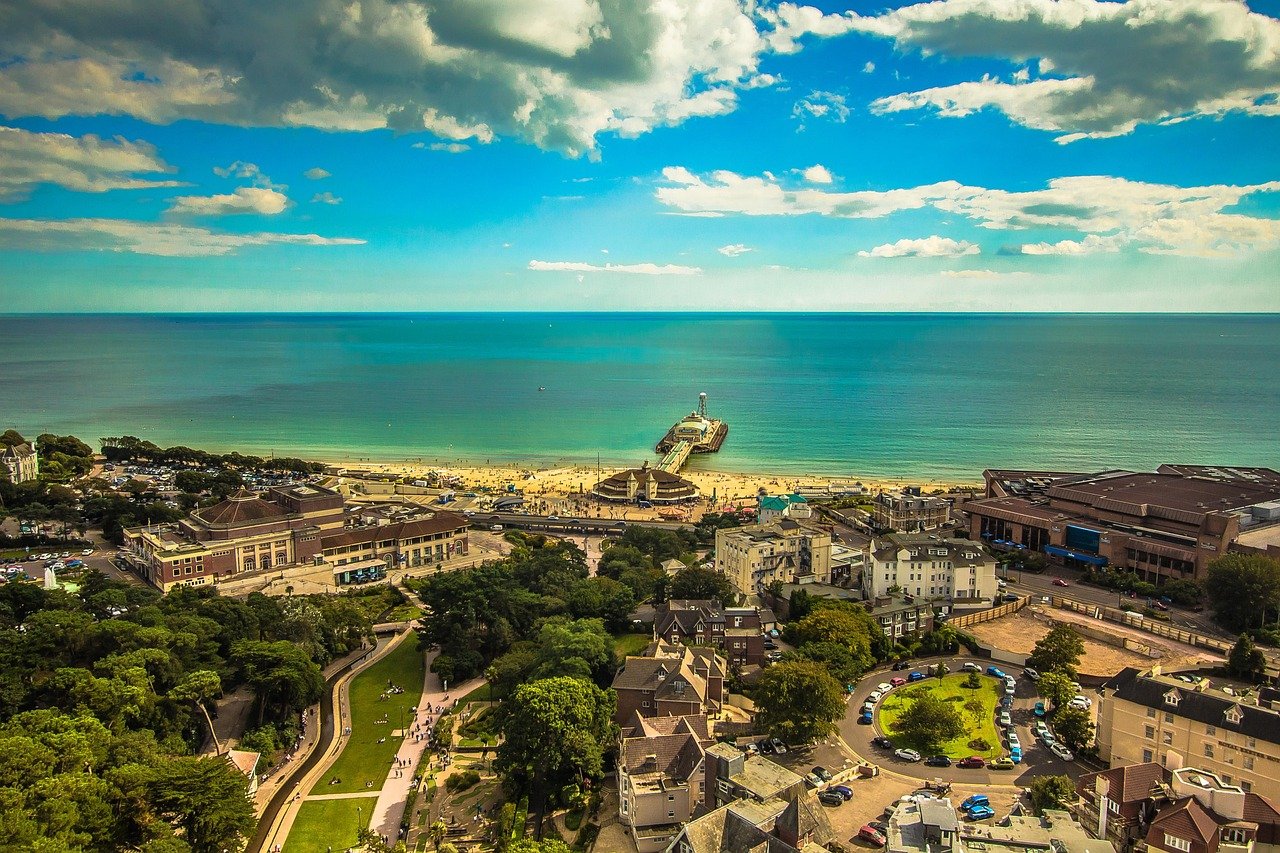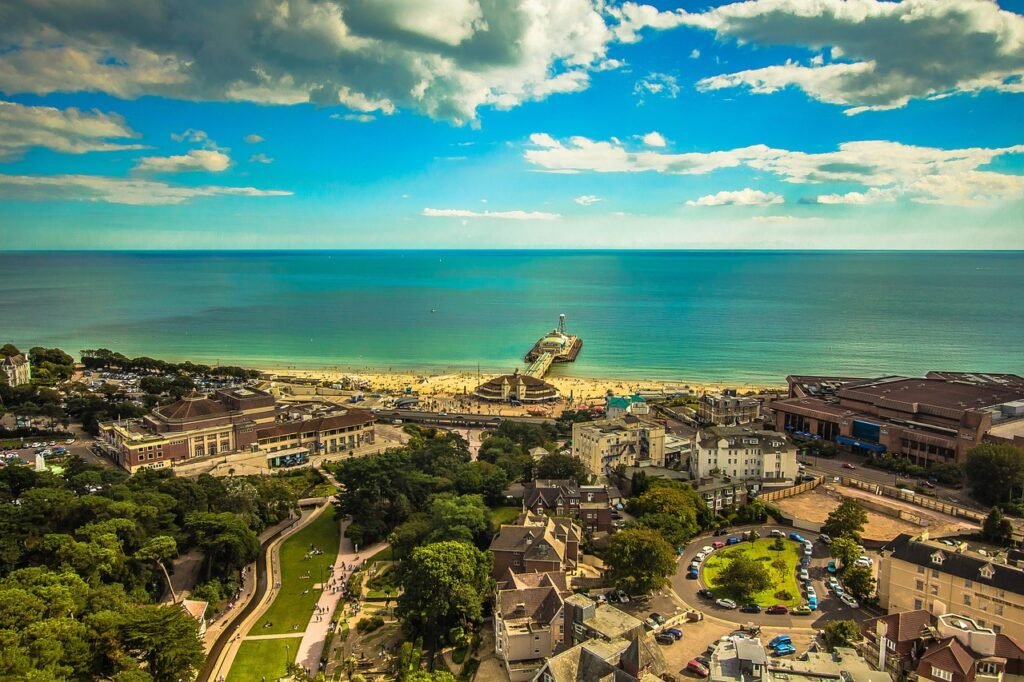Thinking about living in Bournemouth? This complete 2025 guide to the Bournemouth cost of living covers rent, bills, food, transport, leisure, and a Bournemouth vs London comparison—plus tips for students and international movers.
Why Bournemouth (and who this guide is for)
Bournemouth is a vibrant seaside town on England’s south coast. With sandy beaches, a lively centre, and an international community, it attracts students, expats, young professionals, and retirees alike. If you’re weighing up Bournemouth cost of living in 2025 against London—or planning your budget for the 2025 academic year—this guide will help you estimate monthly expenses, understand neighbourhood differences, and decide if living in Bournemouth fits your lifestyle.
We cover rent, utilities, groceries, eating out, transport, leisure, and even day trips from Bournemouth. Topics include Bournemouth cost of living for students 2025, living in Bournemouth as an international student, and Bournemouth vs London cost of living.
Seven miles of sandy beach are one of the biggest cost-free perks of living in Bournemouth.

Bournemouth Cost of Living: Housing & Rent Costs (2025)
Accommodation is the largest monthly cost for most residents. Overall, Bournemouth rent is considerably cheaper than London, with the biggest savings on one-bed flats and shared houses in student areas such as Winton and Charminster.
Average Bournemouth Rent: City Centre vs Suburbs
City centre (1-bed flat): ~£950–£1,200 per month
Suburbs/outside centre (1-bed): ~£800–£1,000 per month
Shared room in a house share: ~£500–£650 per month (often with bills included)
Consequently, coastal hotspots and new-builds tend to command higher prices; moving a few bus stops inland often reduces rent noticeably. For more student options, see our guide to Bournemouth Student Housing in 2025.
Shared Accommodation vs Private Flats
Meanwhile, shared accommodation is popular with students and new arrivals because it lowers both rent and utility costs. Private one-bed flats offer privacy but require a higher monthly budget and usually exclude bills. Furthermore, many student accommodations in Bournemouth bundle utilities and internet, simplifying budgeting. As a result, newcomers can manage their expenses more predictably.
Bournemouth Cost of Living: Utilities & Internet
For a one-bed flat, expect the following in 2025:
Electricity, heating, water, waste: ~£150–£180/month
Broadband (60 Mbps+ unlimited): ~£30–£35/month
In shared houses, bills are frequently split or included in rent. Additionally, winter usage can push costs higher, so consider efficient heating and smart thermostats. Overall, utilities are notably lower than in London, which helps balance your monthly budget.
Bournemouth Cost of Living: Food, Groceries & Eating Out
Grocery prices in Bournemouth are broadly similar to the UK average, whereas eating out is typically cheaper than London’s central areas. On the other hand, premium restaurants in the city centre can still be costly.
Cheapest Supermarkets in Bournemouth
Aldi / Lidl: best for budget staples (milk, eggs, veg)
Tesco / Asda / Sainsbury’s: wider ranges and frequent offers
Waitrose: premium selection at a higher price point
Therefore, typical monthly groceries for a single person are ~£180–£220. Sample basket: milk (£1.15/L), bread (£1.20/loaf), rice (£1.50/kg), chicken breast (£7.50/kg), apples (£2.20/kg), eggs (£2.50/12). In comparison, London grocery costs tend to be higher, especially for fresh produce and organic items.
Eating Out: Budget vs Mid-range
Budget meal: £12–£18
Mid-range for two (3 courses): £60–£70
Cappuccino (centre): ~£3.20
In addition, student-friendly cafes and independent eateries help keep costs down, especially beyond the busiest beachfront strips. As a result, dining out can be affordable without compromising on variety.
Transport & Commuting – Living Costs in Bournemouth
Bournemouth is compact enough that many residents walk or cycle daily. Nevertheless, when you do need public transport, local buses cover the town and adjacent areas. In fact, some students and professionals prefer cycling to save money and stay active.
Bus Fares and Monthly Passes
Single bus fare: £2.50–£3.00
Monthly bus pass: ~£65–£75
Furthermore, students can access discounted fares; check local operators for current offers. Similarly, monthly bus passes provide significant savings for frequent commuters.
Cycling and Walking
Flat seafront promenades and marked cycle routes make active travel easy—and free. Moreover, for occasional intercity trips, advance train tickets to London can be cost-effective. Consequently, transport expenses are generally much lower than in larger cities.
Bournemouth Cost of Living for Students (2025)
With Bournemouth University, Arts University Bournemouth, and multiple language schools, the town has a strong student culture. Consequently, if you’re living in Bournemouth as an international student, you’ll find student-friendly housing, discounts, and a social scene tailored to term time. In other words, life as a student here is both vibrant and manageable financially.
In addition, popular language schools include Anglo-Continental, BEET Language Centre, Southbourne School of English, and Kaplan Bournemouth (check current availability). Moreover, these schools often provide guidance on local housing and part-time jobs.
Student Discounts That Actually Help
Moreover, student discounts really help lower costs:
16–25 Railcard / Student Railcard: ~1/3 off train fares
Local bus student passes: reduced monthly costs
Gyms, cinemas, cafes: look for UNiDAYS / Student Beans offers
As a result, your monthly budget can be significantly reduced.
Estimated student monthly budget (2025): £900–£1,200 depending on accommodation type and lifestyle.
Leisure & Entertainment – Bournemouth Living Costs
Cinema ticket: £10–£12
Gym membership: £35–£45/month
Nightclub entry: £5–£10
The beach, Lower Gardens, and coastal paths are free—thus huge quality-of-life wins that also reduce leisure spending. In addition, local community events and festivals often cost little or nothing, making entertainment accessible for everyone.
Bournemouth vs London: Cost Comparison
Here’s a simplified snapshot of how a typical single person’s monthly costs compare. Exact numbers vary by neighbourhood and lifestyle.
| Expense | Bournemouth (avg.) | London (avg.) |
|---|---|---|
| Rent (1-bed, city centre) | £950–£1,200 | £1,750–£2,500 |
| Utilities (1-bed) | £150–£180 | £250–£300 |
| Monthly transport pass | £65–£75 | £150–£180 |
| Groceries (single) | £180–£220 | ~£250+ |
| Budget meal out | £12–£18 | £15–£25 |
Bottom line: Overall, Bournemouth is roughly 30–40% cheaper than London, with the biggest savings in rent and transport. Therefore, if you’re comparing Bournemouth vs London cost of living, the seaside town wins on affordability and everyday quality of life. In particular, students and young professionals benefit from lower costs without giving up social or cultural opportunities.
Day Trips from Bournemouth – Affordable Living Perks
Budget-friendly day trips are part of Bournemouth’s appeal. For example, use direct buses and seasonal sightseeing routes to explore Dorset and nearby counties. Additionally, planning trips during off-peak times can further reduce travel costs.
Bournemouth → Stonehenge
Time: ~2 hours (varies by operator) | Typical return: £20–£25
Tours and direct services run more frequently in peak seasons.
Bournemouth → Salisbury
Time: ~1 hour | Typical return: £10–£15
Cathedral city charm, plus easy connections to Stonehenge.
Bournemouth → Jurassic Coast (Durdle Door / Lulworth Cove)
Time: ~60–90 minutes | Typical return: £12–£20
Summer open-top routes (e.g., Purbeck Breezer) add extra scenic value.
Practical Money-Saving Tips
In summary, choose shared accommodation to cut rent and bills.
Shop at Aldi/Lidl for staples; batch-cook to reduce waste.
Get a student bus pass or walk/cycle for short trips.
Use a Railcard for intercity travel (up to 1/3 off).
Prioritise free leisure: beaches, gardens, coastal paths.
Moreover, cooking at home, buying in bulk, and using loyalty apps can save even more.
FAQ
Is Bournemouth cheaper than London?
Yes, rent alone is often 40–50% lower. Utilities and eating out are also cheaper, while groceries are similar. In addition, transport costs are substantially lower for most residents..
How much does it cost to live in Bournemouth as a student (2025)?
Typically, £900–£1,200 per month including accommodation, food, transport, and basic leisure. As a result, students can manage on a tighter budget if they take advantage of shared housing and discounts.
Is Bournemouth a good place to live?
Absolutely. It combines lower living costs with a relaxed seaside lifestyle, an international community, and growing career opportunities. In other words, it’s ideal for anyone seeking balance between work, study, and leisure.
Final Thoughts
Therefore, for students, expats, and professionals, Bournemouth cost of living in 2025 is manageable compared to London, especially if you choose shared accommodation and take advantage of discounts. Expect a single-person budget around £1,200–£1,500/month in Bournemouth versus £2,000+ in London.
